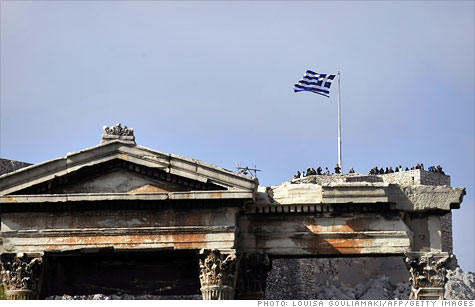Search News

Greece has narrowly avoided more bad news after the industry group responsible for deciding when CDS's are triggered said a "credit event" had not occurred.
NEW YORK (CNNMoney) -- For investors, the words credit default swap can bring back painful memories of 2008. But in the case of Greece, the dreaded derivatives may not be the ticking time bomb some have feared.
Early Thursday, the industry group responsible for deciding when CDS contracts are triggered, said a "credit event" had not occurred in Greece. But the International Swaps and Derivatives Association did leave the door open, saying the situation could change "as further facts come to light."
Credit default swaps are derivatives contracts that investors use to insure against, or profit from, a default. CDS contracts on mortgage-backed securities were at the heart of the crisis that brought the global financial system to its knees four years ago.
The ISDA was asked to review legal steps Greece has taken to force private-sector bondholders to take part in a planned restructuring of Greek government debt, which the nation needs to qualify for a €130 billion bailout from the European Union and International Monetary Fund.
It was also asked to decide whether the European Central Bank, which owns Greek bonds but will not take losses in the restructuring, is being given preferential treatment to private sector bondholders, who stand to lose up to 75% in the deal.
The ISDA's decision committee ruled unanimously that neither development met the conditions of a so-called credit event that would trigger CDS payout's.
But the group noted that the situation in Greece is "still evolving" and that Thursday's decision does not mean a credit event "could occur at a later date."
While a credit event could have had broader implications for Greece and other euro area governments, a ruling that triggered the CDSs would not necessarily have shocked the global financial system.
It would have a "relatively limited impact," said Karl Schamotta, senior market strategist at Western Union Business Solutions. "We don't expect market feathers to be ruffled."
That's because the market for CDS contracts on Greek debt is relatively small, although it is difficult to pinpoint the size because the contracts are mostly private.
Schamotta said estimated payouts on Greek CDS contracts range between $2 billion and $4 billion. By contrast, the overall CDS market hit a high of $30 trillion in 2008, according to some estimates.
In addition to the small size of the market, a default by Greece has been widely anticipated and analysts say it is largely priced into the market, while the subprime mortgage bust caught many by surprise.
Despite those factors, there is cause for concern.
The restructuring has been painstakingly negotiated to be voluntary, a structure designed specifically to avoid triggering CDS contracts.
But the promise of a CDS payout could give investors an incentive to hold out for a default rather than volunteer to take a haircut.
That could put Greece's bailout in jeopardy and raise the threat of a disorderly default, an outcome that European authorities have been anxious to avoid.
Greece needs the private-sector to accept the deal by March 9 in order to secure the bailout money it needs to avoid defaulting outright on a bond payment due March 20.
Under the restructuring deal, investors would take a 53.5% writedown on Greek debt and exchange existing bonds for securities with a lower interest rate. It would eliminate €107 billion from Greece's debt load and save the nation another €150 billion in refinancing costs over the next few years, according to the Institute of International Finance.
Meanwhile, the Greek government recently passed legislation to retroactively include collective action clauses in the contracts that govern most Greek government bonds.
The clauses would force bondholders who refuse to take part in the restructuring to abide by the terms if enough investors sign on voluntarily.
The ISDA has said that the clauses alone would not necessarily constitute a default. But the group suggested that using the clauses to impose losses on investors could qualify as a credit event.
"The real test will come next week, when the Greek government announces whether it will use those retroactively introduced clauses to force bondholders to participate in the restructuring of Greece's debt," said Carl Weinberg, chief economist at High Frequency Economics, in a note to clients. "If so, we expect ISDA will trigger the CDS and then who knows what might happen?"
If that were to occur, it could set a precedent for other euro area governments at risk of a default.
"I am certain that, if the CDSs become effective, we will see an increase in the corresponding prices for Italian, Portuguese and even Spanish sovereign bonds," said Dimitri Papadimitriou, a professor of economics at Bard College.
That could revive concerns about a full-blown debt contagion in the euro zone and spark another bout of turmoil in global financial markets.
| Index | Last | Change | % Change |
|---|---|---|---|
| Dow | 32,627.97 | -234.33 | -0.71% |
| Nasdaq | 13,215.24 | 99.07 | 0.76% |
| S&P 500 | 3,913.10 | -2.36 | -0.06% |
| Treasuries | 1.73 | 0.00 | 0.12% |
| Company | Price | Change | % Change |
|---|---|---|---|
| Ford Motor Co | 8.29 | 0.05 | 0.61% |
| Advanced Micro Devic... | 54.59 | 0.70 | 1.30% |
| Cisco Systems Inc | 47.49 | -2.44 | -4.89% |
| General Electric Co | 13.00 | -0.16 | -1.22% |
| Kraft Heinz Co | 27.84 | -2.20 | -7.32% |
| Overnight Avg Rate | Latest | Change | Last Week |
|---|---|---|---|
| 30 yr fixed | 3.80% | 3.88% | |
| 15 yr fixed | 3.20% | 3.23% | |
| 5/1 ARM | 3.84% | 3.88% | |
| 30 yr refi | 3.82% | 3.93% | |
| 15 yr refi | 3.20% | 3.23% |
Today's featured rates: